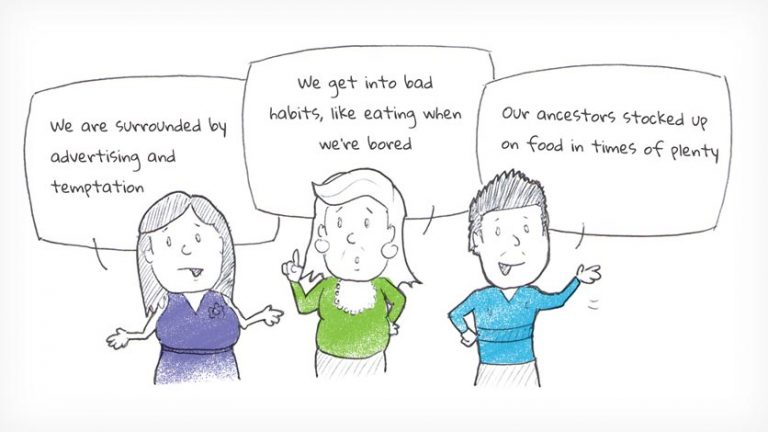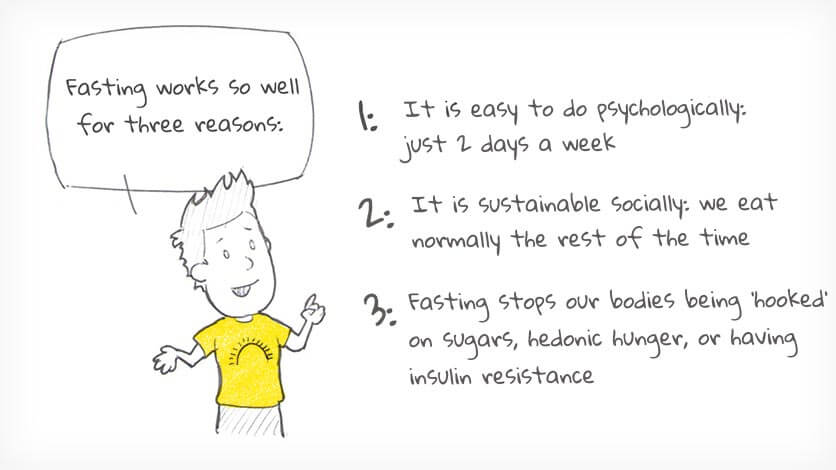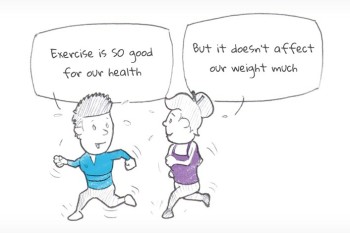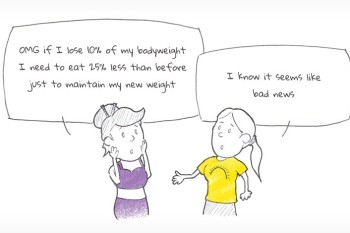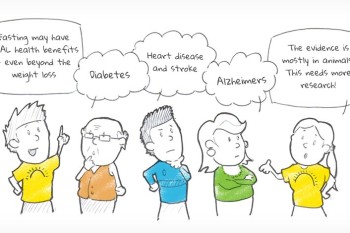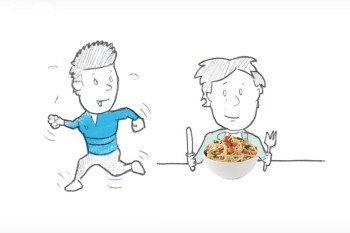There are many explanations for why we eat more than we need, and gain weight.
These explanations include:
-
Social and cultural reasons: we live in societies that are full of temptation, and we are constantly surrounded by food advertising, huge portion sizes and other prompts to eat too much. The food industry wants us to eat more, and they manage to persuade us.
-
Psychological reasons: some people are ‘emotional eaters’; others have fallen into bad habits and eat when they are bored or need something to do. Depression is also a common cause of overeating.
-
Evolutionary reasons: living in a land of plenty is very new for humankind in evolutionary terms. We have been programmed by evolution to ‘stock up’ on food while it is plentiful because our ancestors would have experienced balancing periods without food. In the modern world, we are always stocking up, and never burning our reserves – hence we gain weight.
You may be interested to learn, however, that it is not all in our heads, and neither is it all about social factors, indeed there are many reasons. One of the most important is that our bodies also appear to get ‘hooked’ on overeating.
There are several theories about the factors driving the obesity epidemic. Some of these (the first two) are generally accepted by scientists; others are important and interesting but controversial.
1. We have circuits in our brain that control ‘hedonic hunger’ (eating when not hungry).1 These circuits exist for evolutionary reasons, telling us to stock up on food while it is plentiful. These pathways, unfortunately, appear to be more active after a period of weight loss and drive us to put weight back on. When food is always available and we never experience periods of famine, these hedonic hunger circuits are always turned on: we are hooked on overeating. Our hormones, including thyroid hormones, leptin and ghrelin do try to minimize the weight gained, but for most people a gradual increase in weight over the years is normal.
2. Our bodies develop insulin resistance. Insulin is released whenever blood glucose rises ( i.e. after a meal) and acts to keep blood glucose within safe limits. When we overeat, particularly on sugary, high carbohydrate foods, our insulin levels are continually high. The constant influx of glucose may prompt the body’s cells, which do not want to absorb any more glucose, to start to resist the effects of insulin. This means glucose levels in the blood remain high, and the body makes even more insulin to try to combat it. A vicious cycle is created. Insulin and glucose levels are both high and we become locked into a cycle of putting on fat but never burning it off.2 Insulin resistance is a highly dangerous situation and is the first step on the road to type 2 diabetes, heart disease, and many other diseases. Eating a diet high in sugary foods creates a kind of ‘one way street’ in which the body can only store fat but never release it and this excessive storage leads to increased hunger.3 As we age, we typically become more and more insulin resistant, again leading to a gradual increase in weight over the years.
3. A more controversial theory4 is that the prevalence of fructose in our diets plays a unique and causative role in the increasing rates of cardiovascular disease, hypertension, diabetes, cancer, and nonalcoholic fatty liver disease. The theory is that fructose behaves in the liver and brain in a similar way to alcohol. In the liver, fructose stimulates fat production and also induces hepatic (liver) inflammation. In the brain, fructose may stimulate the “hedonic pathway”, creating an addiction similar to alcohol addiction.
4. Some recent scientific studies have suggested that, as with sugar, a similar addictive-like state may emerge with foods that combine sugar and fat.5 Rats and mice fed a diet high in fat and sugar but then returned to their old healthy diet show signs of stress on withdrawal of the fat and sugar diet and are willing to withstand discomfort to gain access to the unhealthy diet once again. This does not happen with diets high in fat alone and to a lesser degree with high sugar diets. The combination of fat and sugar seems to be a particularly powerful one. It is notable that almost all ‘junk foods’ are high in both fat and carbohydrate (ice cream, chocolate, pastries, chips, french fries). It is also interesting that there are almost no foods in nature that combine significant amounts of sugar and fat.
5. Changes in the types of bacteria that inhabit our intestines or even infections with certain viruses may be a factor. Scientists have identified a variety of viruses and bacteria that can increase fat stores in animals and, conversely, some kinds of bacteria that can promote fat burning.6
6. Inflammation has long been known to be associated with obesity, but it is uncertain whether the inflammation is a cause or the result of obesity.6
7. If our parents were overweight, we are probably not surprised if we develop the same problems, but the potential for one’s children to become obese is not fixed. For example, scientists have discovered that children born to women who suffered a period of famine are more likely to develop obesity than those whose mothers did not,7 while for mothers who have had weight loss surgery, any children born before the surgery have a higher risk of developing obesity than those born after the surgery.6 Many other environmental factors seem to be able to make changes that can alter the risk of developing obesity, in particular a woman’s age and health when she has her children.6
8. Sleep, or the lack of it, has been shown in many studies to be linked with obesity.6 The levels of several hormones that affect appetite and metabolism are affected by poor sleep. Even mild sleep deprivation (5–6 hours of sleep per night compared with 7–9 hours of sleep) was associated with higher rates of obesity.
9. Living in a warm, not too hot, not too cold, environment is very comfortable and desirable but even that seems to be detrimental when it comes to keeping slim. Like with fasting, the mild stress of being exposed to heat or cold appears to be beneficial, not only because we expend more calories when too hot or too cold in trying to keep our body temperature stable but also because of effects on our whole metabolism.6
10. Environmental toxins and prescription drugs influence many aspects of our bodies’ functioning resulting in an increased likelihood of gaining weight.6 In particular, the build up of the effects of exposure to environmental factors over time might contribute to the tendency to gain weight as we age.
Intermittent fasting can reverse the trend
Luckily for us, though, Intermittent fasting seems to have a beneficial effect on many aspects of the hormonal and brain systems that influence body weight, making it easier to lose weight, and easier to keep it off.
At FastDay we believe that a really effective Way of Eating needs to be sustainable in our minds and in our social environments….but it also needs to help our bodies be free from being ‘hooked’ on bad habits.

